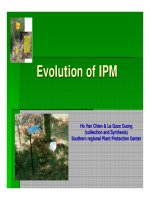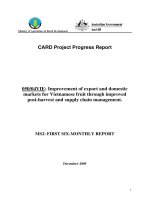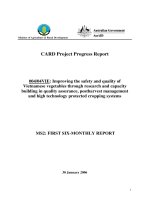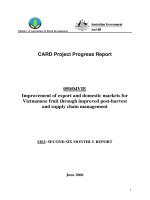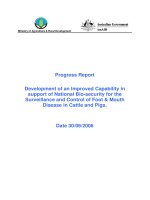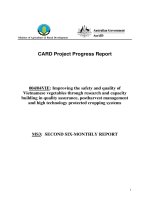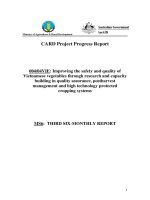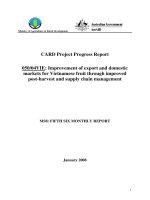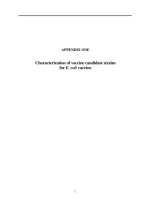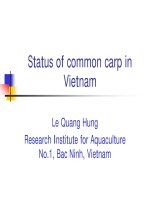Báo cáo nghiên cứu khoa học " Improvement of export and domestic markets for Vietnamese fruit through improved post-harvest and supply chain management - MS8 " ppt
Bạn đang xem bản rút gọn của tài liệu. Xem và tải ngay bản đầy đủ của tài liệu tại đây (466.3 KB, 56 trang )
Ministry of Agriculture & Rural Development
CARD Project Progress Report
050/04VIE: Improvement of export and domestic
markets for Vietnamese fruit through improved
post-harvest and supply chain management
MS8: FIFTH SIX MONTHLY REPORT
January 2008
1
Table of Contents
1. Institute Information 1
2. Project Abstract 3
3. Executive Summary 3
4. Introduction & Background 4
5. Progress to Date 5
Implementation Highlights 5
Smallholder Benefits 11
Capacity Building 13
Publicity 15
Project Management 16
6. Report on Cross-Cutting Issues 17
Environment 17
Gender and Social Issues 18
7. Implementation & Sustainability Issues 20
Issues and Constraints 20
Options 21
Sustainability 22
8. Next Critical Steps 23
9. Conclusion 23
10. Statutory Declaration Error! Bookmark not defined.
1
1. Institute Information
Project Name
Improvement of export and domestic
markets for Vietnamese fruit through
improved post-harvest and supply
chain management.
Vietnamese Institution
Southern Sub-Institute of Agricultural
Engineering and Post-Harvest
Technology (SIAEP)
Vietnamese Project Team Leader
Mr Nguyen Duy Duc, M. Eng.
Australian Organisation
Queensland Department of Primary
Industries and Fisheries (DPI & F)
Australian Personnel
Mr. Robert Nissen
Dr. Peter Hofman
Mr Brett Tucker
Mr. Roland Holmes
Ms Marlo Rankin
Date commenced
June 2005
Completion date (original)
May 2008
Completion date (revised)
June 2008
Reporting period
Progress Report 3 Six Monthly January
2007
Contact Officer(s)
In Australia: Team Leader
Name:
Mr. Robert Nissen
Telephone:
+61 07 54449631
Position:
Project Leader
Fax:
+61 07 54412235
Organisation
Queensland Department of
Primary Industries and
Fisheries (DPI & F)
Email:
In Australia: Administrative contact
Name:
Michelle Robbins
Telephone:
+61 07 3346 2711
Position:
Senior Planning Officer
(Emerging Technologies)
Fax:
+61 07 3346 2727
Organisation
Queensland Department
of Primary Industries and
Email:
1
Fisheries (DPI & F)
In Viet Nam
Name:
Mr Nguyen Duy Duc,
Telephone:
+84 (8) 8481151
Position:
Director SIAEP
Fax:
+84 (8) 8438842
Organisation
Southern Sub-Institute of
Agricultural Engineering and Post-
Harvest Technology (SIAEP)
Email:
2
2. Project Abstract
The fruit industry in Vietnam has a great potential and plays an important role in
agricultural production. In 2003, Vietnam exported US$43 million of high value fruit to
high-income countries and imported US$14 million of fruit and vegetables. Vietnam is
experiencing difficulties in competing with other Asian nations in export markets and its
own domestic market, especially with China and Thailand. This suggests that Vietnam’s
horticultural industries require substantial development to be globally competitive.
Vietnamese consumers are demanding safer and higher quality fruit. This project has
identified key pre-and post-harvest technology gaps that reduce product quality, safety
and consistency. Targeted training programs are focusing on the total supply chain and are
providing benefits by helping to implement quality management systems and GAP
systems at the village level, providing greater employment for the farming community.
This project embraces the five CARD strategies for rural development; and in particular;
strategies to increase production and competitiveness of agricultural systems; reduce
poverty and vulnerability, and increase stakeholder participation whilst ensuring
sustainability.
3. Executive Summary
The strategic plans developed as part of this CARD Project for mango and pomelo are now
being implemented by SIAEP and SOFRI team members.
Four members of the CARD Project team from SOFRI and the Director of SOFRI attended
the International Society for Horticultural Science, International Symposium on Supply Chain
Management, “Improving the performance of supply chains in the transitional economies,
Responding to the demands of integrated value chains” held in Hanoi Vietnam from 23-27
September 2007. Several excellent papers were presented by SOFRI staff to an international
audience. One paper focused on analysis of supply chains using strengths, weakness,
opportunities and threats analytical method for the tropical and subtropical fruit industry in
Vietnam. Another talk focused on the Good Agricultural Practices (GAP) and how they
related to the domestic and export market development for Vietnamese fruit.
In January 2008 a meeting held with Metro Cash and Carry, Le Thi Minh Trang, Quality
Assurance Manager and Stephane Maurin, Divisional Manager–Fresh Food to set up new
supply chains for Vietnamese’s farmer cooperatives. Talks focused on setting up trial
shipments of Cat Hoa Loc mango from 2 cooperative in the Tien Giang Province to Metro
Cash and Carry in Ho Chi Minh City.
Further economic studies were carried out on the production of high quality, high value Cat
Hoa Loc mango fruit for speciality markets in HCMC by SOFRI Staff. This study found that
fruit bagging during the May to August period could significantly increase incomes by 27%
lifting socio-economic standings of farmers.
3
4. Introduction & Background
Fruit and Vegetable crops are highly lucrative compared to staple crops. Horticultural
produce has high value-added and income generation potential when compared to livestock
and grain production. Horticulture is highly attractive especially for small scale farmers, and
has a comparative advantage, particularly where land holdings are small, labour is abundant
and markets reasonably accessible (Weinberger and Lumpkin, 2006). This situation is
particularly true in Mekong Delta and Central South Cost Province of Khanh Hoa, Viet Nam.
Ford et al., (2003), suggested the competitiveness of Vietnamese fruit industries were failing
due to poor, unstable product quality, no quality standards, poor post harvest technologies and
pre-harvest practices, lack of group co-operative marketing structures and little information
about supply chains, prices and customers needs.
This project is addressing these constraints by engaging with key Vietnamese stakeholders
from research institutes (SIAEP and SOFRI) and local farmers in the mango and pomelo
industries in Southern Viet Nam. This project has taken account of the total supply chain
network and focused on where significant benefits are to be gained in the pre- harvest, post-
harvest and marketing sectors.
The objectives of the project are:
• Improved pre-harvest technologies to produce high quality mango (integrated pest
management, integrated crop management, fruit fly control, maturity indices,
reduced pesticide residues, better environmental and human health etc)
• Improved mango and pomelo post-harvest technologies (eg cool chain management,
packaging, post-harvest dipping, ethylene ripening, waxing, washing and wetting
agents, quality assurance)
• Improved quality standards and quality assurance programs for mango and pomelo.
The approach and methodologies developed for these crops through this project will
be applied to other fruits and vegetables.
• Mapping of current supply chains to domestic and selected export markets, with
particular emphasis on determining consumer preferences and needs, and reporting
results back to farmers.
• Provide a better understanding and possible improvements of the supply chain by
Viet Namese fruit industries for mango and pomelo.
This project will fill capacity gaps and reduce major weaknesses in pre-and post-harvest
technologies improving product quality consistency and supply chain management and
planning. Highly specialised targeted training programs appropriate for institutions and
industry stakeholders will be provided.
At the local village and district level, cluster development of farmer/grower groups should
ensure better on-farm prices. This will increase power to these farmers which will benefit all
members of the supply chain (intermediaries to retailers) rather than the present power
brokers in the chain. Farm incomes will therefore increase and result in better standard of
living for rural families. In addition, if quality management systems are implemented at the
village and district level through more appropriate fruit quality standards, packaging and
grading systems, increase returns should result creating greater employment. The flow on
4
effects of this will benefit the poor in the rural areas, and specifically help provide more jobs
for rural women.
5. Progress to Date
Implementation Highlights
Implementation highlights of CARD Project activities
Training in GAP and IPM/IDM
The strategic plans developed as part of this CARD Project for mango and pomelo are now
being implemented by SIAEP and SOFRI team members. These activities align with the
proposed project activities 3, 4, 5, 6, 7, 8, 11, 12 and 13 and project milestones 4, 7, 9 and 10.
Top 5 Priorities for the Mango Strategic Plan:- Listing in Order of Importance for Mango
Industry
1. Improve production process (e.g. follow GAP)
2. Improve the linkages between farmers – traders – customers, scientists and
government also need to be involved
3. Assessable market information for export and domestic markets
4. Improve packing and storing procedures/Need technical support to improve storing,
packing and packaging material
5. Government to help with planning and development for specialised fruit growing area
Top 5 Priorities for the Pomelo Strategic Plan:- Listing in Order of Importance for Mango
Industry
1. Supporting techniques from seedling–farming-harvesting (Guidance for GAP)
2. Advice/counsel on standards/specifications of products
3. Intensively farming and production areas
4. Training on IPM
5. Improving applicability of farming techniques and technologies of harvesting, packing
and transporting
In September-October 2007 and January-February 2008 CARD Project training of mango and
pomelo farmers via farmer schools was conducted by SIAEP and SOFRI and Australian
personnel.
This training focused on:
• the development of GAP including pest and disease management (IPM/IDM)
for both mango and pomelo
• improving pre- and post-harvest farming techniques and technologies for
mango and pomelo
• improving linkages between growers, traders, customers, scientists, extension
agents and government.
This training aligns with the strategic priorities for mango and pomelo:
• Priority one and two for mango
• Priority one, two, three, four and five for pomelo
5
CARD project capacity building (demonstration of skills obtained)
To document and test the competencies of SOFRI staff in applying supply chain analysis and
methodologies and quality assurance procedures (CARD Project milestone 10), four members
of the CARD Project team from SOFRI and the Director of SOFRI attended the International
Society for Horticultural Science, International Symposium on Supply Chain Management,
“Improving the performance of supply chains in the transitional economies, Responding to
the demands of integrated value chains” held in Hanoi Vietnam from 23-27 September 2007.
Several excellent papers were presented by SOFRI staff to an international audience. One
paper focused on analysis of supply chains using strengths, weakness, opportunities and
threats analytical method for the tropical and subtropical fruit industry in Vietnam. Another
talk focused on the Good Agricultural Practices (GAP) and how they related to the domestic
and export market development for Vietnamese fruit which aligns with CARD project
milestone 7 and 10 and activities 8, 9, 10, 11, 12 and 13.
SOFRI Teams member who attend the conference were:
o Dr Nguyen Minh Chau (Director of SOFRI)
o Nguyen Van Hoa
o Le Thi Thu Hong
o Tran Nguyen Lie Minh
o Ta minh Tuan
Mr Nissen also presented two papers to this conference. One of Mr Nissen’s papers detailed
the development of new processes for evaluation and implementing new improved supply
chains operating in South-East Asia. This paper aligns with milestone 4 and 7, methodology
and analytical techniques and training material for supply chain analysis and development and
key issues and options for improved supply chain management as well as the roles and
responsibilities and implementation process to improve supply chain in South-East Asia (See
Appendix A for a copy of this paper).
Development of new supply chains
In January 2008 a meeting held with Metro Cash and Carry, Le Thi Minh Trang, Quality
Assurance Manager and Stephane Maurin, Divisional Manager–Fresh Food, focused on
setting up trial shipments of Cat Hoa Loc mango from 2 cooperative in the Tien Giang
Province to Metro Cash and Carry in Ho Chi Minh City. Quality guides developed as part of
this CARD project (Milestone 4) and now being finalised and will be used to assure product
quality of the Cat Hoa Loc mango during these trial shipments to Metro.
Four different packaging systems will be employed in these trial shipments and experiments.
These experiments will determine the most economically viable and appropriate packaging
system for Cat Hoa Loc Mango in Southern Vietnam. This aligns with CARD project
activities 8, 9, 10 and 13 and with priority 4 and 3 of the mango strategic plan developed by
this CARD Project.
Farmer training schools and workshops conducted
September-October farmer training schools
Training in September–October 2007 was carried out by the Vietnamese staff of SIAEP and
SOFRI institutes and Australia personnel. Courses were conducted in My Tho, Tien Giang
Province and at Nha Trang, Khanh Hoa Province, Vietnam for both mango and pomelo
farmers. Intensive farmer schools and training workshops were one day in length and
structured as:
6
• Day one - pre-harvest training
• Introduce supply chain concept
o Analysis of the Vietnamese supply chains
• Pre harvest (based on GAP)
o Orchard design
o Orchard pruning and training
o IPM training
o IDM training
• Day two - post-harvest training
o Post harvest
• Handling
• Harvesting (picking)
• Sorting and grading
• Packing
• Storing
The process employed during training workshops and farmer schools allows farmers,
extension agents and researchers to discuss ideas, develop solutions to problems encountered
in developing improved post-harvest practices and new supply chains. Workshops conducted
in September-October 2007 and January-February 2008 by Australian trainers were held at
SIAEP and SOFRI training rooms as well as military training rooms in My Tho. Whilst these
workshops were specifically designed as farmer schools, using participatory action learning
principles, trainers researchers and extension agents were in attendance (see Appendix B for
farmer group discussion notes taken during farmer training schools and Appendix C for list of
participants).
January-February 2008 farmer training schools
Training in January-February 2008 was carried out by the Australia personnel. Courses were
conducted at SOFRI, Tien Giang Province, Vietnam. Rowland Holmes and Robert Nissen
conducted a two day workshop for the trainer and farmer training school on mango pests and
diseases.
These training activities listed above align with project activities 6, 7, 11 and 12 and project
milestones 7, 9 and the Strategic Plans for mango and pomelo developed by this CARD
Project (see Appendix C for list of participants).
Development of new supply chains for mango and pomelo
In September-October 2007 and January-February 2008 further workshops were conducted
and analysis of data collected for the development of quality guides in consultation with the
supply chain participants for mango and pomelo. In January-February 2008 an overview of
the draft copy of the Cat Hoa Loc mango Quality Guide was shown and discussed with Metro
Cash and Carry Le Thi Minh Trang, Quality Assurance Manager and Stephane Maurin,
Divisional Manager–Fresh Food to determine their needs and input. These activities align
with CARD project Milestone 4 and activities 8, 9, 10, 11, 12, and 13 and with focus on
further development of “Metro” type supply chain as suggested by the CARD PMU in their
MS6 appraisal report.
Socio-economic analysis of supply chains
7
In September-October 2007 and January-February 2008 further workshops were conducted on
gathering socio-economic data of mango and pomelo supply chain in the Mekong Delta of
Southern Vietnam. Analysis of data is continuing and further data collection and analysis is
being undertaken by the Vietnamese institutes SIAEP, SOFRI and Australian personnel.
These activities align with CARD project activities 8, 9, 10, 12 and 13 and milestones 7, 9
and 10.
Workshop evaluations
The ORID system was used to evaluate the effectiveness of the eight farmer training schools
and workshops conducted in September-October 2007 and January-February 2008. Both
Vietnamese farmers and SIAEP and SOFRI staff were surveyed at the completion of each
workshop. The workshops conducted were:
• Mango and pomelo orchard management
• Mango and pomelo pre-harvest management to optimise product quality
• Mango and pomelo post-Harvest management to optimise product quality
• Mango orchard management and IPM/IDM to optimise product quality
Analysis of the workshops for September-October 2007 using the ORID system showed on
average that:-
• workshop length:- range was from 70% to 90% with an average of 83% of
participants found that the workshops were of the right time length with the remaining
17% indicating that they were too short. These participants indicated workshops
should be between three to 5 days in length.
• trainees understanding of concepts:- range was from 65% to 70% with an average of
68% of participants understood the concepts very well, with the remaining 32%
understanding concepts well.
• new information:- for the orchard management workshops, 85% of all participants
indicated that information presented was new to them with the remaining 15%
indicating most of the information was new to them. For the pre-and post-harvest
management workshops, 65% of all participants indicted that information presented
was new to them with the remaining 35% indicating most of the information was new
to them.
• usefulness of information provided:- range 75 to 86% with and average 79.5% of
participants indicated that the information would be very usefull in working with other
professionals and growers to develop new supply chains, whilst the remaining 20.5%
indicated that all the information would be useful.
• trainees use of materials:- range 90 to 95% with an average of 92% of participants
indicated that training methods used and information provided would be used by them.
• trainees confidence in using techniques and methodology:- range 90% to 100% with
an average of 95% of participants indicated that their confidence would improve with
further training.
• cultural barriers:- range 34% to 47% with an average of 40% of participants indicated
that there may be some cultural barriers in implementing new methods, whilst 20%
were unsure and 40% believed there were no barriers for post harvest workshops.
•
For orchard management and pre harvest workshops range 30% to 47% with an
average of 50% of participants indicated that there may be some cultural barriers in
implementing new methods, whilst 30% were unsure and 20% believed there were no
barriers.
8
• trainer’s knowledge:- 77% of participants believed that the trainers were very good
whilst the remaining 23% of participants believed trainers were good
• fulfilling trainees expectations:- 77% of participants indicated that their personal
expectations with the workshops and their needs were highly satisfied. The remaining
23% had their expectation satisfied.
Training manuals, workshop materials and information supplied as part of this CARD
Project.
CARD Project workshop manuals developed to date are:
1. Introduction to Food Supply/Value Chains
2. Developing Food Supply/Value Chains
3. Improving Export and Domestic Markets for Vietnamese Fruit through Improved
Supply Chain Management
a. Strategic Planning
b. Mapping and Developing Supply Chains
c. Analysing Supply Chains
d. Determining Improvements and Developing new Supply Chains
e. Developing Action Plans
f. Evaluating and Monitoring Supply chains
4. Supply/Value Chain Analysis: Surveys and Interview techniques and questionnaires
Design
5. Quality Flows: Monitoring Quality via Sequential Sampling of Mango and Pomelo
down the length of the Supply/Value Chain
6. Developing New Improved Horticultural Supply Chains
a. How to Develop a New Supply Chain
b. Market Research and Segmentation
c. Building and Marketing Strategy
d. Supply Chain Development
i. Getting The Product right
ii. Building Effective Information and Communication Strategy
iii. Building and Effective Distribution and Logistics System
iv. Building Effective Relationships
v. Creating Shared Value
1. Monitoring Quality
2.
Packaging
7. Mango and Citrus Orchard Design
a. Orchard Layout
b. Farm access and facilities
c. Water courses and dams
d. Positioning rows
e. Training and pruning systems
f. Planting trees
8. Mango Post-harvest Physiology Manual
a. Post-harvest biology
i. Fruit ripening and quality loss
ii. Main causes of quality loss after harvest
iii. Post-harvest technology
1. Introduction to mango post-harvest physiology
2. Harvesting and field handling
3. Packhouse operations and practices
9
4. Ripening and storage
5. Transport for mango
6. Know your market
7. Causes and Solutions of post-harvest defects
9. Designing Training Workshops for Mango and Pomelo Farmers in Vietnam
10. Farm Economic Analysis Workbook
11. Mango and citrus orchard design workbook and training manual
12. Farmer workbook and training manual on citrus training and pruning
13. Trainer workbook and manual on citrus training and pruning
14. Citrus pests and diseases workbook and training manual
15. Using chemicals workbook and training manual
16. Mango pest management workbook and training manual
17. Optimising harvest quality in mangoes workbook and training manual provided to
trainers
Manuals supplied to date are:
1. Mango Cultivation Handbook
2. Mango Pest Control Handbook
3. Mango Disease Handbook
4. Pomelo Handbook
5. Mango and Citrus Orchard Design
6. Mango Information Kit (DPI&F Agrilink Publication Translated into Vietnamese)
7. Citrus Information Kit (DPI&F Agrilink Publication)
8. Citrus Pests and Their Natural Enemies (DPI&F Publication)
9. The Good Bug Book (ABC Publication Book)
Workshop material developed by the Vietnamese personnel and used in these workshops
were:-
• Mango cultivation handbook
• Mango disease control handbook
• Mango pest control handbook
• Farmer Leaflets and handouts on mango pest control
Milestone achievements
As per the CARD Project Management Unit agreed and approved adjusted milestones in the
1
st
six monthly report (Appendix A), this project has achieved all milestones on budget.
Whilst there has been some slippage in delivery of some milestones due to uncontrollable and
unforseen events, this CARD project remains on track. Milestones and achievement to date
are:
• Milestone 1 June 2005 (Submitted and accepted)
o contract signed
• Milestone 2 January 2006 (Submitted and accepted)
o 1
st
six monthly report submitted and statutory declaration and training inputs
highlighted
• Milestone 3 July 2006 (Submitted and accepted)
o 2
nd
Six monthly report submitted and statutory declaration and training inputs
highlighted
• Milestone 4 January 2007 (Not submitted, quality guides are in the final stage of
developed and consultation with supply chain participants will be undertaken)
10
o Methodology, analytical techniques and training material for supply chain
analysis and development
o Supply Chain maps for mangos and pomelo
o Strategic Plan for mangos and pomelo
o Mango post-harvest training and physiology manual completed
o Quality assurance manuals for mango and pomelo - near final draft stage
• Milestone 5 January 2007 (Submitted and accepted)
o 3
rd
Six monthly report submitted and statutory declaration and training inputs
highlighted
• Milestone 6 September 2007 (Submitted and accepted)
o 4
th
Six monthly report submitted and statutory declaration and training inputs
highlighted.
• Milestone 7 (not submitted as development of training aids suited to operating
conditions and culture aspects in Vietnam are still continuing)
o Key issues and options for improved supply chain management of selected
fruits (completed as part of the strategic planning process)
o Identification of roles, responsibilities and implementation timetables for
improved supply chains (Roles and responsibilities designated in action plans
developed during this CARD project)
o Complete set of promotion material including: - (i) training aids for farmer
training programs; (ii) promotional and awareness material.
• Milestone 8
o 4
th
Six monthly report submitted and statutory declaration and training inputs
highlighted.
Smallholder Benefits
Improving on farm inputs
This CARD project has demonstrated that improved on farm practices (new orchard designs;
pruning and training systems; IPM and IDM systems) will greatly improve the living
standards of farmers via implementation of improved farming and supply chain practices.
Whilst many of these practices are a significant improvement on traditional practices they are
only part of a sustainable GAP system.
On farm socio-economic studies carried out by SOFRI and SIAEP staff showed that
improvements via increased inputs and management practices significantly improve farmer’s
returns in the Mekong Delta.
Mango
Preliminary surveys of Xoai (Mango) cultivar “Cat Hoa Loc” farmers in the Hoa Hung
Commune, Cai Be District, Tien giang Province in the Mekong Delta of Vietnam indicates
that:-
• Growers with high levels of management practices and high input levels obtain a
profit of VND 15,105,000 per 1000m
2
, 2.1 times greater than growers with mid level
management practices and mid level inputs and 3.7 times greater than grower with
low level management practices and inputs.
• Mangoes are mainly sold at local markets. It is recommended to improve income,
farmers should develop market opportunities in HCMC and northern Vietnam.
Pomelo
11
Preliminary surveys of Buoi (Pomelo) cultivar “Nan Roi” in the My Hoa Commune, Binh
Minh District, Vinh Long Province in the Mekong Delta of Vietnam indicates that:-
• Growers with high levels of management practices and high input levels obtain a
profit of VND 3,576,000 per 1000m
2
, 2.4 times greater than growers with mid level
management practices and mid level inputs and 3.9 times greater than grower with
low level management practices and inputs.
• Pomelos are mainly sold at local markets. It is recommended that farmers to improve
income they should develop market opportunities in HCMC and northern Vietnam and
look at ways of direct selling to the consumer.
Economics benefits of producing high quality mango fruit.
Further economic studies were carried out on the production of high quality, high value Cat
Hoa Loc mango fruit for speciality markets in HCMC by SOFRI Staff. Fruit were marketed
through the traditional marketing channels to test if collectors and wholesalers were prepared
to pay a premium for higher quality fruit. Studies were carried out during May to August
2007 using single tree plots in a randomised block design. Fruit were bagged using a special
fruit bag designed and manufactured in Taiwan.
Bagged fruit were sprayed once with pesticides (before bagging), while non-bagged fruit were
sprayed a further seven times. This bagging method provides to consumers a chemical free,
safe product. An 87% reduction pesticides costs was achieved using fruit bagging. Table 1
below show 10% to 20% increase in fruit quality achieved using fruit bags across all fruit
grades. Table 2 below, show the price received in VND/kg for each fruit grade for bagged
and non-bagged fruit.
Table1. Comparison of fruit grades, bagged fruit verses non-bagged fruit.
Grade Fruit Bagging (%) Non-Fruit Bagging (%) % change
Class 1 60 40 20
Class 2 30 40 10
Class 3 10 20 10
Table 2. Comparison of prices per fruit grade for bagged fruit verses non-bagged fruit.
Grade Fruit Bagging
(VND/kg)
Non-Fruit Bagging
(VND/kg)
% change
Class 1 35 000 30 000 14
Class 2 25 000 20 000 20
Class 3 10 000 7 000 30
Comparing production costs of fruit bagging on one Cat Hoa Loc mango tree to one tree that
was not bagged was 231 200 VND vs. 128 000 VND. Comparison of income from one Cat
Hoa Loc mango tree with bagged fruit verses one tree where the fruit were not bagged was
2 573 000 VND vs. 1 824 800 VND. Profit earned from one Cat Hoa Loc mango tree that
was bagged was 2 341 800 VND compared to a non-bagged tree of Cat Hoa Loc 1 696 800
VND. This study found that fruit bagging during the May to August period could
significantly increase incomes by 27% lifting socio-economic standings. Further analysis of
this data is being undertaken by SOFRI, SIAEP and Australian personnel. These activities
align with CARD project activities 8, 9, 10, 12 and 13 and milestones 7, 9 and 10.
12
Developing new chains
This CARD project through SIAEP and SOFRI staff are working with the various groups of
the supply chain participants (farmers groups to consumers) in the mango and pomelo supply
chains in Vietnam. For example:- Three different supply chains will be evaluated these are:
o Traditional supply chain and traditional packaging
o New supply chain with new packaging systems
o New Cat Hoa Loc mango supply chian to Metro Cash and Carry
Two Cat Hoa Loc mango cooperatives will participate in trial shipments of high quality Cat
Hoa Loc mango fruit to Metro Cash and Carry in HCMC. Trials will be conducted in May-
June 2008 and will include four different packaging systems for Extra Class and Class 1 Cat
Hoa Loc mango fruit.
Fruit is to be graded and packed according to the fruit quality guide developed as part of this
project by farmers, collectors, wholesalers, SIAEP, SOFRI and Australian personnel. Fruit
are to be transported from the two cooperatives in Tien Gian Province using air-conditioned
transport vehicles for trial shipment to Metro. This is to emulate a cool chain system. Fruit
quality assessment will be made at each point of exchange along the supply chain by both
SIAEP and SOFRI staff and feedback will be obtained from Metro staff on fruit quality.
It is anticipated that farmers and cooperatives participating in these trial shipments will obtain
benefits in terms of improved returns and market information thereby improving their socio-
economic status. These activities align with CARD project Milestone 4 and activities 8, 9,
10, 11, 12, and 13 and with focus on further development of “Metro” type supply chain as
suggested by the CARD PMU in their MS6 appraisal report.
Capacity Building
Training workshops processes
SIAEP and SOFRI staff members along with several key farmers and supply chain members
participated in over eight workshops during September October 2007 and January-February
2008. These workshops involved “participatory action learning”, “farmer schools” and
“farmer training farmer” processes to develop solutions to improving pre-, post-harvest and
supply chain management impacts on mango and pomelo fruit quality. This consultative and
participatory action learning approach is designed to empower the rural poor and supply chain
participants in the decision making processes. Processes employed allow this CARD project
to obtain solid support from a cross section from all supply chain participants. Based on the
agreed directions in the strategic and action plans for both the mango and pomelo, the CARD
project participants (SIEAP, SOFRI staff and the mango and pomelo farmers) develop skills
via workshops aligned to the CARD Project objectives.
Mr. Nissen conducted 15 training workshops during September-October 2007 and January-
February 2008 and Mr Nissen and Mr Rowland Holmes conducted 2 training workshops in
January-February 2008 in excess of 24 days. This follows on from the 4 training workshops
conducted by Mr Nissen and Ms Rankin in November-December 2006 for 15 days for
trainers, farmers, collectors and wholesalers.
13
Emphasis was placed on mango pest and diseases, infield fruit handling and post-harvest
handling on mangoes. This workshop was one of the three farmer training exercises to be
conducted during this project trip by Australian team members. This workshop layed the
foundation for the Vietnamese trainers and farmers who will then conduct further training of
the Vietnamese farmers in pre- and post-harvest handling of mango. The information
supplied and discussed in this workshop will be used to develop the Vietnamese farmers
training workshops and manuals for improving the mango supply chains.
Workshops for September-October were:-
• Introduction to supply chains
o Analysis of Vietnamese supply chains
• Pre-Harvest workshop for mango
o Orchard design
o Orchard pruning and training
o IPM Training
o IDM Training
• Post-harvest workshop mango
o Post harvest handling
Post harvest physiology
o Harvesting and picking
o Sorting and grading
o Packing
o Storing
o Food safety
• Developing quality assurance guides for mango and pomleo in Vietnam
• Developing socio-economic supply chain evaluations and analysis for Vietnam
• Development findings on new supply chains in Vietnam
o New supply chain developments
o Action plan review
o Sequential sampling and surveys
o Planning activities for the next 6 months
These 11 workshops were conducted on:
• 1
st
October 2007:- Workshop 1
• 2
nd
October 2007:- Workshop 2
• 3
rd
October 2007:- Workshop 3
• 4
th
October 2007:- Workshop 4
• 5
th
October 2007:- Workshop 5
• 8
th
October 2007:- Workshop 6
• 9
th
October 2007:- Workshop 7
• 10
th
October 2007:- Workshop 8
• 11
th
October 2007:- Workshop 9
• 12
th
October 2007:- Workshop 10
• 13
th
October 2007:- Workshop 11
These workshops were conducted on:
• 14
th
21
st
January 2008 Trainer in ASEAN Training on Post Harvest Technology on
Vegetables and Fruits
14
• .
• 22
nd
-24
th
January 2008 Pomelo and mango quality guide development with SIAEP
and SOFRI Staff.
• 25
th
January ASEAN Training on Post Harvest Technology on Vegetables and Fruits
and Socio-economic Workshop on Mango Fruit Bagging and Mango Supply Chain
analysis in Vietnam with SIAEP and SOFRI Staff.
• 29
th
& 30
th
January 2008 Mango IPM and IDM workshop with SIAEP and SOFRI
staff
• 31
st
January 2008 Mango IPM and IDM workshop with farmers from two Cat Hoa
Loc mango cooperatives.
• 4
th
– 6
th
February Workshop on developing quality assurance guides for mango and
pomleo in Vietnam. Socio-economic analysis workshops were conducted with
SIAEP and SOFRI staff.
• 7
th
February workshop on development of CARD project action plans
• Responsibilities for SIAEP and SOFRI Staff and areas of work for CARD project.
Training manuals and PowerPoint presentations developed for workshops were:
• Australian Processes Used to Manage Fresh Product Quality and Food Safety
• Handling and Transporting of Fresh Produce along a Supply Chain in Australia to
Maintain Produce Quality and Deliver a Safe Product To The Consumer
• Marketing and Focus Group Training Workshop
• Post-harvest physiology and handling of mango
• Designing workshop for mango and pomelo farmers in Vietnam
• Developing quality assurance guides for mango and pomleo in Vietnam
• Developing socio-economic supply chain evaluations and analysis for Vietnam
• Mango Disease Management
• Mango Pests and Disease Field Guide
• Mango Pest Management
• Mango Pest Management Workbook
• Optimising harvest quality in mangoes workbook and training manual provided to
trainers
Director Nguyen Duy Duc and SIAEP staff organised and conducted an “ASEAN Training
course on Post-harvest Technology on Vegetables and Fruits” in Ho Chi Minh City, Vietnam
from 13-26
th
January 2008. This training course was well received by all the ASEAN
nations’ participants from Brunei, Cambodia, Indonesia, Philippines, Lao PD R, Myanmar,
Malaysia, Singapore, Thailand, and Vietnam. Five SIAEP staff members provided talks and
papers with a further four staff members providing laboratory demonstrations on measuring
fruit and vegetable quality and measuring chemical residues and food safety issues.
Publicity
Two publicity articles were developed with one article was included in the DPI&F annual
report. This article highlighted work conducted by DPI&F as part of this AusAID CARD
funded project in South Vietnam. Mr Nissen highlighted the AusAID CARD project through
papers presented at the Food and Agricultural Organisation of the United Nations Regional
Office for Asia and the Pacific (RAP) conference held in Chiang Mai Thailand and the
International Society for Horticultural Science conference held in Hanoi, September 2007.
15
Project Management
Linkages to other projects
During the January-February 2008 visit by Mr Nissen, Director Nguyen Duy Duc and Mr
Nissen made direct linkages to between the CARD Project 050/04 VIE and the ASEAN
Secretariat South-South Cooperation Project and A-J partnership Project Funded by MAFF
Japan were formed. Mr Nissen provided training and workshop material to the ASEAN
training course that was developed for the CARD project to train SIAEP, SOFRI, farmers,
collectors, wholesaler and retailers. Previous CARD project training and material assisted
SIAEP staff to conduct this ASEAN training course.
Closer linkages with the joint RMIT and DPI&F project staff working on Quality Assurance
Systems for ASEAN Fruit and Vegetables (QASAFV) is still being undertaken. The
QASAFV project is one of 10 projects initiated under the ASEAN Australian Development
Cooperation Program (AADCP). Exchange of information has occurred on a regular basis.
The information exchanged covered areas such as:
• product quality concepts and quality assurance guidelines
• development of ASEAN GAP standards
• supply chain development and evaluation processes
• extension training methodologies for training trainers
Project activities management
During this 6 month period, project activities were intense in an effort to try to catch up on the
project timeline. Factors that interrupted the project activities timeline in the previous 6
months have caused some slippage in activities. This was due to circumstances beyond Mr.
Nissens control. Activities and training workshops to be conducted in early 2007 were
deferred to July-August 2007. Personal health problems of Dr. Hofman and Mr. Nissen
caused these delays as detailed in the previous six monthly report.
Whilst there has been a significant amount of work conducted during this six month period
and in particular training of farmers and SIAEP and SOFRI Staff, delays in obtaining samples
due to crop production and product availability delays the development of the quality
assurance guides and developing new supply chains.
Due to these two factors mentioned above we therefore respectfully request the CARD
Project Management Unit grant us an extension on this CARD project timeline by three
months, so all activities, manuals and reports can be completed to the highest quality possible.
No extra money is required but a three month extension be granted to accommodate for the
delays caused by the Australian team health problems, failures in crops by Emu Exports
Vietnam in Khanh Hoa province due to unforseen environmental conditions. See appendix C
for the suggested adjusted timeline.
16
6. Report on Cross-Cutting Issues
Environment
Environmental issues previously identified by many farmers in the Mekong Delta of Vietnam
are still of major concern. Issues such as:
• agricultural spray practices (incorrect and constant use of agricultural chemicals
insecticides, fungicides and growth regulators to achieve a profitable production level
• types of fertiliser, organic and inorganic, application methods and effects on the
environment through contamination of water ways etc.
• mixed farming systems, traditional cultural practices (animal, orchard and vegetable
farming practices)
• contamination of irrigation water via grey water and salt water incursions
• incorrect water management practices and irrigation methods (e.g. disposal of grey
water, and by product contamination of waterways, over watering, nutrient leaching
and runoff)
Agricultural spray application, methodology and practices
Understanding how risk and its role in the farmers decision making process is critical to
developing solutions to problems with agricultural spray applications. Even though many
farmers do not directly spelt out the levels of risk they face, risk does impact heavily on their
decision making process.
Chemical representatives provide technical information about a chemical’s effectiveness and
appropriative use in Vietnam. There are a large number of chemical products for farmers to
use in Vietnam, adding to the confusion when using pesticides or fungicides to combat a
particular problem. Many chemical firms propagate such confusion to deliberately maintain
market share. This can lead to disaster as many farmers believe these chemicals to be the
technical innovation that will get them out of a pest or disease management problem. Poor
management of a disease or pest through inappropriate use of chemicals may wipe out, within
a few years, the benefit of many years of new research into new management practices and
systems.
Many farmers develop their own individualistic management strategies instead of tackling the
problem on a community or industry wide basis. Avoidance strategies such as:
• supplement income with off farm activities
• transfer of risk to other people on farm or off farm such as a collector who
purchases the crop
• individualistic strategies, such as “I will not spray my crop at this time as it
will cost too much and the farmer next door does not spray at all, therefore
why should I spray?”
Crop protection always triggers the emergence of different, and often conflicting, strategies
among farmers and stakeholders. This depends upon their strategies and their position in the
commodity chain and their relationships with other farmers.
Many researchers and extension agents have to learn to deal with an aggregate of individual
behaviours and strategies. This is extremely difficult and complex. The researcher and/or
extension agent has to combine all facets that farmers deal with, into one ideal strategy. Then
they have to select and assist champion farmers to put these new technologies and innovations
17
into practice and show how they improve upon the management practice or system
traditionally used. Sustainable IPM and IDM systems require that environmental and agro-
ecological factors be translated into socio-economic objectives for farmers. By translating
these factors into socio-economic outcomes provides farmers with a method of assessing the
risk of not carrying out a sustainable practice.
Many farmers are conscious of environmental impacts and incorrect use of chemicals. The
harsh reality is; if they do not use chemicals, the fear of crop loss is very high and the impact
on family income overrides their concerns for the environment and safe chemical practices.
At times there are only a few alternatives to calendar spray regimes but training in IPM and
IDM systems will lead to a substantial change in agricultural chemical usage.
Implementation of good IPM/IDM systems and demonstrations are essential to achieve
farmer acceptance of such a system. The use of monitoring systems can substantially
decrease chemical usage, increasing food safety and reducing the chemical impact on the
environment. Monitoring systems need to include:
• weather conditions
• sampling disease or pest prevalence in the orchard
• establishment of disease incidence levels related to crop loss and economic
impacts
Orchard design and layout.
This project found that many small Vietnamese orchards are poorly designed. They have
large trees which are not easily harvested or sprayed. Orchards need to be redesigned to by
reducing tree size to facilitate pest and disease control measures and light interception to
produce high quality fruit. If this is not done, then pest and disease problems will increase
and control measures will become less effective, causing severe financial losses. Poorly
designed and maintained orchards can result in
• a build up of disease and pests
• disease and pest resistance to chemicals
• contamination of soil and waterways due to incorrect spray methods, rates and
disposal of containers
Farmer training in mango and citrus orchard design and layout was carried out by this CARD
Project in September-October 2007 using participatory action learning and farmer schools.
This highly successful workshop resulted in many farmers drawing orchard plans and
discussion on how to change existing orchards.
Gender and Social Issues
Social Issues
Education of farmers, collectors, transporters, wholesalers and retailers is critical to achieving
improvements in the supply chain. Significant improvements in food safety and GAP at the
farmer level are needed if Vietnamese fruit supply chains are to achieve compliance with
large domestic food retailers and export market quality standards.
Many assume that increasing production and food safety levels at the small scale farmer level
could be achieved through more efficient use of existing resources and technologies. This
assumption does not consider the small scale farmers’ perspective, and implies that many
18
small scale farmers are totally technology-backward, do not know how to implement new
technologies and that they lack any aspirations or entrepreneurship to improve their way of
life.
It has been is widely accepted that technologies should be developed by research centres
which are isolated from the commercial farming situation and then transferred to small scale
farmers who in turn adopt it. This fails to take into account the farmers’ priorities,
constraints, availability to resources and their socio-economic aspirations. The adoption of
new technologies depends upon a building process between the champion farmers, collectors,
wholesalers (participants) who want to improve and those assisting them (researchers and
extension agents).
These assistants (researchers and extension agents) or technology providers must take into
account many factors and analyse the farmers, collectors, and wholesalers priorities, and
strategies, and conduct on site experiments with these participants. Then develop
recommendations through collective decision making processes that will take into account
risks faced by each participant. Imported research methods and technological packages from
outside sources need to be tested and adapted to suit local conditions. Also if funds are highly
restricted, many farmers, collectors, wholesalers (participants) will simply turn to other crops
that are easier to deal with rather than tackle the real underlying issues.
Top down development models that are purely driven by technical questions do not get fully
adopted because they are not related to local on-farm circumstances. Many researchers and
extension agents do not cooperate fully with farmers because the fear of failure or lack of
funding to fully assess the situation, usually because of budget constraints. Access to
technical information and market data is critical to small scale farmer success. Many farmers
have access to broad general information, but specific information on market volumes and
product quality is non existent. In many instances, middlemen are the only the only source of
market information. Local middlemen in Vietnam are much more than salesman; they often
burden small scale farmers with debts. Any product that proves to be unsaleable, this debt is
transferred back to the farmer from participants further down the chain. Problems and
unexpected costs encountered further up the supply chain are also transferred back to the
farmer. This is due to the belief that many fruit are in over supply situation, which is not the
case in many instances. Many chain participants bargain for a lower price and/or purchasing
lower grade produce, then sell at a higher price, so greater profits can be made. This removes
any rewards for investors in these new farming systems and reduces small scale farmer
entrepreneurial aspirations and faith in the marketing system.
Factors that affect the adoption of new farming practices in the Mekong Delta, Vietnam are
related to the entrepreneurial aspirations and capital investment by small, medium and large
scale farmers, collectors, and wholesales. Many farmers believe that new modern farming
practices and management techniques that rely on (e.g. inorganic fertilizers and synthetic
fungicides and insecticides) are the only way to improve productivity and their socio-
economic standing. Many of theses new farming practices and management techniques come
at a significant economic, production and environmental cost to these investors. Many
investors (small scale farmers) do not understand that these costs will significantly deplete
their available cash in the short term, unless product quality and net returns for produce
marketed are greatly improved. Many of the supply chain and marketing systems presently in
place in the Mekong Delta and southern Vietnam do not provide adequate or enhanced returns
for higher quality product, but this now starting to change.
19
Consumers in Ho Chi Minh City are now starting to demand a safe, higher quality product,
grown organically and no chemicals residues. Therefore, many small scale farmers are trying
to put in place GAP, IPM and IDM, and organic fertilisers. Most small scale farmers find
implementing GAP, IPM and IDM systems are too complex, too demanding on their time,
have limited availability to cash, traditional orchard designs and farming practices do not
allow full implementation of these new techniques or farming practices and weather
conditions are not favourable during some production periods. This then leads to less than
favourable outcomes for these investors and a loss in faith that these new practices will
deliver benefits.
This CARD project has tried to overcome these constraints by implementing a process which
has is documented in Appendix A.
Gender Issues
Previous reports indicated the need to incorporate, encourage and support the role of women
in the design and implementation of project objectives and outputs. This project recognises
the vital role women play at all levels of both mango and pomelo supply chains.
Women dominate the post-harvest marketing and sale of the fruit in Vietnam. They often
represent the majority of collectors, wholesalers, traders and retailers in local and regional
markets. Greater than 85% of sellers are women.
As previously indicated the Vietnamese project team is well represented with women. They
are playing a very important role in training farmers and conducting surveys and data
collection in markets. Both Director Nguyen Duy Duc (SIAEP) and Dr. Nguyen Minh Chau
and Dr Hong (SIAEP) are committed to the professional development of female staff.
SIAEP’s Director, Mr Nguyen Duy Duc, and SOFRI’s Director, Dr Nguyen Minh Chau
should be congratulated for their foresight in having the faith, by providing the project with
female staff who are committed to getting the job done.
7. Implementation & Sustainability Issues
Issues and Constraints
Fruit quality and safety standards
As reported previously higher grade standards through the traditional supply chains will be
very difficult to achieve. Fruit grade standards for mango and pomelo are difficult to
implement. This is because most supply chain participants (farmers, collectors, transporters,
and wholesalers are locked into the traditional marketing system. The risks associated with
change in practices are greate for these supply chain participants. Therefore a system where
a gradual change occurs, in a step by step process, reducing the risk factors for each supply
chain participant. This CARD Project has developed preliminary quality standards but
acceptance by all of the supply chain participants will have to be obtained by training
collectors wholesalers, traders and retailers. This project is now implementing some supply
chain demonstrations in conjunction with two mango cooperatives in the Tien Giang
Province. It is anticipated in May 2008 that mango fruit will be graded according to the
20
quality guides and transported to high value markets (Metro) in HCMH and the socio-
economic benefits to each supply chain participant of these trials be documented by SOFRI
and SIAEP staff.
Developing new supply chians
Training of researchers, extension agents and farmers on developing new supply chains is still
continuing and will continue until this project is completed in the second half of 2008. The
development of new supply chain will rest with supply chain champions who want to improve
their performance, product quality and income. Therefore the development of these new
supply chains:-
• cannot be enforced by the researchers and extension agent
• researchers and extension agents can assist supply chain champions with technical
advice and training workshops to ensure that they (the champions) obtain maximum
benefits from the new supply chains
• business to business transactions have to be constructed and conducted by the chain
champions themselves, but advice may be provided by researchers and extension
agents and other business professionals
Many farmers and supply chain champions are risk adverse and will not change from
traditional practices. Many farmers and supply chain champions believe that before change
can be undertaken, their families’ security, food and social welfare etc., has to be assured and
significant income generated to allow investment in new ventures. This CARD project agrees
with family security reasons, but change will come from market and customer pressure and
change may be imposed through this market pressure.
The training and knowledge provided by this project will have a significant impact on how
farmers and supply chain champions handle this change.
GAP with emphasis on IPM/IDM issues
This CARD Project in September-October 2007 and January 2008 provided training in
IPM/IDM for mango and pomelo. It will be up to farmers to implement IPM/IDM practices.
Survey results form this CARD project showed that high income farmers had high inputs and
management practices may assist other framers in their respective cooperatives. Their
experiences and results will provide inspiration for other farmers to improve practices.
Options
Development of new supply chains based on grade standards for both pomelo and mango is
still being undertaken via consultation with farmers, collectors, traders, wholesalers. Grade
standards and quality guides and are now in the final phase of development and
implementation. The development of a quality guide for pomelo and mango was to be
finalised earlier but set backs in obtaining high quality photographs of problems and highly
desirable quality product has been difficult. The CARD Project team has now collected a
good set of photographs and these manuals are now being finalised.
These new supply chains being developed by this project will have to fight for their existence
against older more established chains. However, if these new chains can reduce losses or
21
have a higher of proportion of their fruit accepted as grade/class 1 by the wholesalers then this
will improve their returns.
Mango and pomelo farmers and supply chain participants wishing to access high value
markets in HCMC will have to:-
• work together as members of an informal chain group
• agree to follow the same management practices
o pest and disease agrochemical programs to ensure a safe product
o harvesting practices (maturity index)
o ensure grade/quality standards
o use similar packaging to ensure protection of their brand and trade marks
The CARD project will continue to train supply chain participants on how to implement GAP
principles (pre-and post- harvest), grade standards and develop their supply chains to high
value markets in HCMC. These participatory action learning farmer, collector, wholesaler,
transporter and wholesaler schools/workshops will be on GAP, IPM, IDM, optimising harvest
quality, packaging, stacking and handling to ensure a high quality product reaches the
consumer in HCMC.
A time extension of three months be granted by the CARD PMU to enable all activities to be
completed to the highest possible standard and all reports and manuals be completed in both
English and Vietnamese and presented to the CARD PMU.
Sustainability
As reported, this project is addressing sustainability issues through
• “participatory action learning” (PAL), farmer schools and “farmer training framer”
(FTF) process involving CARD project supply chain participants (grower/farmers,
collectors, traders, wholesalers, exporters) section of champions and industry leaders.
• train the trainer workshops of SIAEP and SOFRI project staff, who will have
capability to expand methodologies and processes used in this project to other
industries
• workshops that provide information on GAP, IPM and IDM principles and linking
these to other previous CARD Projects such as the Dragon Fruit project and AADCP
project and ASEAN Training workshops on Post-harvest Technologies.
• providing background information on the benefits of health and safety, environmental
and social impacts of implementing GAP, IPM and IDM methods in new pre- and
post–harvest practices
• establishing supply chain maps for product, communication and monetary flows,
infrastructure and skills audits
• undertaking process analysis to determine problems and obtain input from participants
on solution to problems encountered in the supply chains
• undertaking baseline surveys on quality and survey to assess improvements being
implemented
• identifying and assisting farmers/collectors/wholesalers/traders and exporters and
retailers implement new pre- and post-harvest practices
• assisting farmers/collectors/wholesalers/traders and exporters to develop new
improved supply chians
22
If sustainability problems do arise, they are being addressed by the project through
participatory action learning process, and this project is making good progress in addressing
issues above. One issue of concern and still highlighted very strongly by many farmers,
involves financial assistance. The project team members believe that some of these issues can
be addressed through development of grower financial training project and government
assistance through special schemes set up to assist farmers to implement GAP principles.
8. Next Critical Steps
These have been grouped under the following categories based on strategic plan and are as
follows:
• Development and implement GAP, focussing initially on IPM and IDM systems will
be carried out in July 2008.
• Improving applicability of farming techniques and technologies of harvesting, packing
and transporting. Training to be carried out in May 2008, July 2008.
• Reducing post-harvest losses by establishing a demonstration of production, sorting,
packing and transport systems to provide the quality required by Metro in HCMC will
be carried out in May 2008. These activities will depend entirely on the availability of
high quality mango fruit from the two cooperatives in the Tein Giang Province in
Mekong Delta. It is also envisaged that in May 2008 farmer training workshops and
exercises will take place at Emu Export Ltd operations, demonstrating improved
practices which comply with GAP.
• Develop new improved high value supply chains for farmer groups in HCMC. These
activities will depend upon the grower cooperatives and their ability to develop their
supply chains. SIAEP and SOFRI staff as part of this CARD project will facilitate
and provide training in technical aspects of developing new high value chains but
business to business dealings and practices will have to be handled by the cooperative
business members. These CARD project activities will take place in May 2008.
• Improve linkages between farmers, traders, customers, scientists and government also
need to be involved. Through this CARD project providing training workshops to
farmers and all supply chain participants, greater linkages between farmers, traders,
customers, scientists and government will be formed. Evidence of this is the CARD
Project training of SIAEP and SOFRI staff and material supplied, which has assisted
SIAEP in the delivery of training workshops for Metro in their joint project with GTZ
and the Ministry of Commerce in Vietnam and ASEAN Training conducted by
SIAEP.
• Further strengthen linkages with ASEAN GAP project to assist Vietnamese farmers
develop a standard for good agricultural practice during production, harvesting and
post harvest handling of fruit and vegetables in the Asian Region. Food safety
modules, product quality and environmental management and worker health and
safety material will be supplied by this project.
9. Conclusion
This project is still receiving very good support from the Vietnamese Institutes, SIAEP
Director Nguyen Duy Duc and SOFRI Director, Nguyen Min Chau. Whilst there have been
some delays due to unforseen personal issues the Australian staff involved in this project, it is
hoped that all project activities and milestones will be on track. SIAEP and SOFRI project
23
